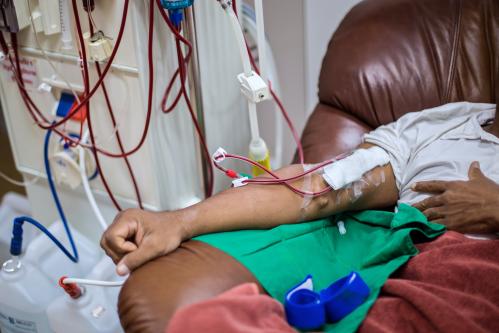

Past Event
Content from the Brookings Doha Center is now archived. In September 2021, after 14 years of impactful partnership, Brookings and the Brookings Doha Center announced that they were ending their affiliation. The Brookings Doha Center is now the Middle East Council on Global Affairs, a separate public policy institution based in Qatar.
The Brookings Doha Center (BDC) hosted a webinar discussion on May 11, 2020, about public health systems across the Middle East and North Africa (MENA) and their response to the COVID-19 pandemic. Panelists discussed effective containment strategies, measures taken by states of the Gulf Cooperation Council (GCC), and the Qatari context. The panel consisted of a group of distinguished scholars and experts, including: Hanan Abdul Rahim, dean of the College of Health Sciences at Qatar University; Mohamud A. Verjee, assistant dean for student affairs at Weill Cornell Medicine-Qatar; and Sameh El-Saharty, a lead health specialist for the World Bank.
Hanan Abdul Rahim began the discussion, describing what an effective response to the pandemic entails. Firstly, she noted countries that have proven successful in containing the virus such as South Korea, Taiwan, and New Zealand. In looking at such countries’ strategies, one finds points in common that indicate the necessary steps of containment. Firstly, international experience has shown the importance of having an organized governance mechanism, as it allows the state to carry out aggressive action early on. Abdul Rahim stressed that a timely response is crucial and strict measures are less effective if delayed. Moreover, a successful response entails the capacity to test widely. Countries should be able to test not only those who show symptoms but the greater population, as this will provide a better sense of the virus’ spread. In addition, states should leverage technology to carry out tracking and tracing, and communicate clearly to their public what is expected of them. Adul Rahim then spoke about the MENA region and how it has fared in the face of COVID-19. Whilst the Arab world is far from monolithic, many countries have in common a young population and this has allowed for lower fatality rates. Finally, Jordan has demonstrated that even with fewer resources, a country can still quell the virus’ spread if it imposes the correct measures.
Sameh El-Saharty continued the discussion and outlined the containment measures of GCC countries. Firstly, states were prompt to close international travel and this helped to control the number of imported cases. Moreover, governments stopped major events, closed public venues, and established social distancing guidelines. In support of such measures, countries across the Gulf have demonstrated a strong system of testing, tracing, and isolation. For instance, Kuwait provided tracking bracelets to all citizens returning from abroad and this reduced the need for institutional quarantine. Finally, GCC states have proven especially adept in protecting their health care workers and launching campaigns focused on hygiene and social distancing. Furthermore, El-Saharty spoke about the pandemic’s effects on public health systems across the Gulf. He noted that, much like the rest of the world, the virus has put a strain on emergency facilities, however, less is being said about non-emergency services. El-Saharty stated that COVID-19 has caused a 50 percent reduction of routine care across GCC states and that 8 million patient contacts are canceled per week.
Mohamud A. Verjee provided further details on the case of Qatar. He noted that when news of COVID-19 and its dangers started to emerge, the country did not have a single case. The spread of the virus first in Asia and then in Europe, allowed the country to prepare and take proactive measures. Moreover, Qatar has dedicated many resources to quell the virus’ spread. The country has set up drive-through testing, set aside more than 11,000 beds for those convalescing, and designated 30 hotels to host individuals in quarantine. While Qatar has recorded a high number of cases it has managed to treat all of its patients without becoming overwhelmed. In addition, the country’s fatality rate is tremendously low and this is likely due to the young population. Finally, Verjee stated that nations should wait to relax social distancing measures so as to avoid a second wave of outbreaks. On this front, Germany provides a cautionary tale. The country maintained a low fatality rate compared to its European neighbors at the beginning of the pandemic, however, it is now experiencing a second spike in cases after gently easing restrictions.
In the subsequent question and answer session, panelists discussed relaxing measures, re-opening the economy, and vaccines. Abdul Rahim noted that prior to easing restrictions, countries should pay close attention to their daily infection rate to ensure they have a sustained decline of new cases. Moreover, they should also prepare themselves to act quickly in the event of a second outbreak. El-Saharty contended that some sectors of the economy will be able to open sooner than others, namely those that maintain a low health risk but high economic benefit. Finally, Verjee commented on the possibility of a vaccine and declared that it may not be the answer to all of our problems. For instance, many are re-infected with the flu despite having been vaccinated.

Elaine Kamarck
May 14, 2025

Richard G. Frank, Sherry Glied
May 14, 2025

Matt Kasman, Adam Sedlak, Lydia Reader, William J. Heerman, Russell R. Pate, Amelie G. Ramirez, Evan C. Sommer, Shari L. Barkin, Ross A. Hammond
April 15, 2025